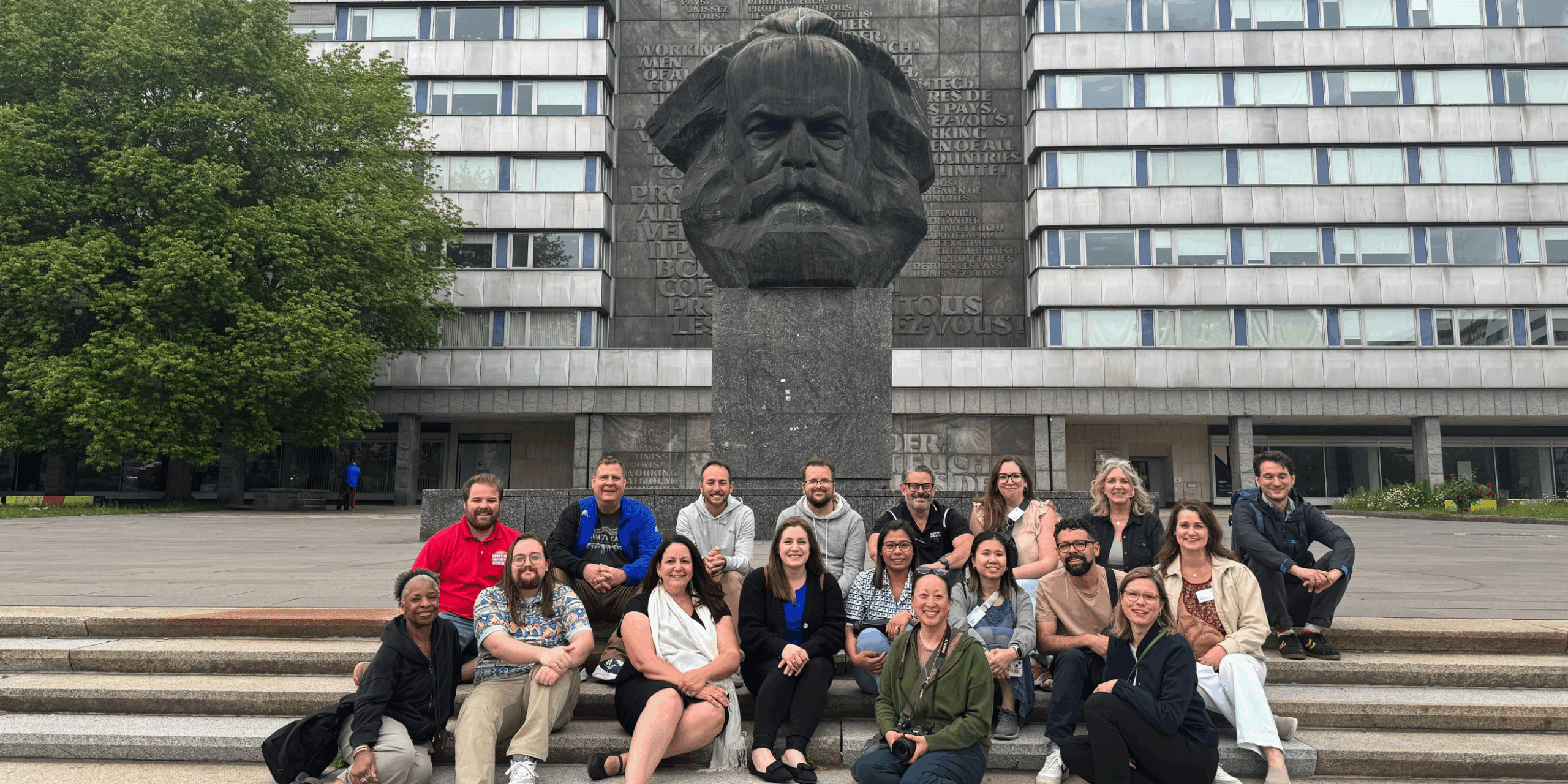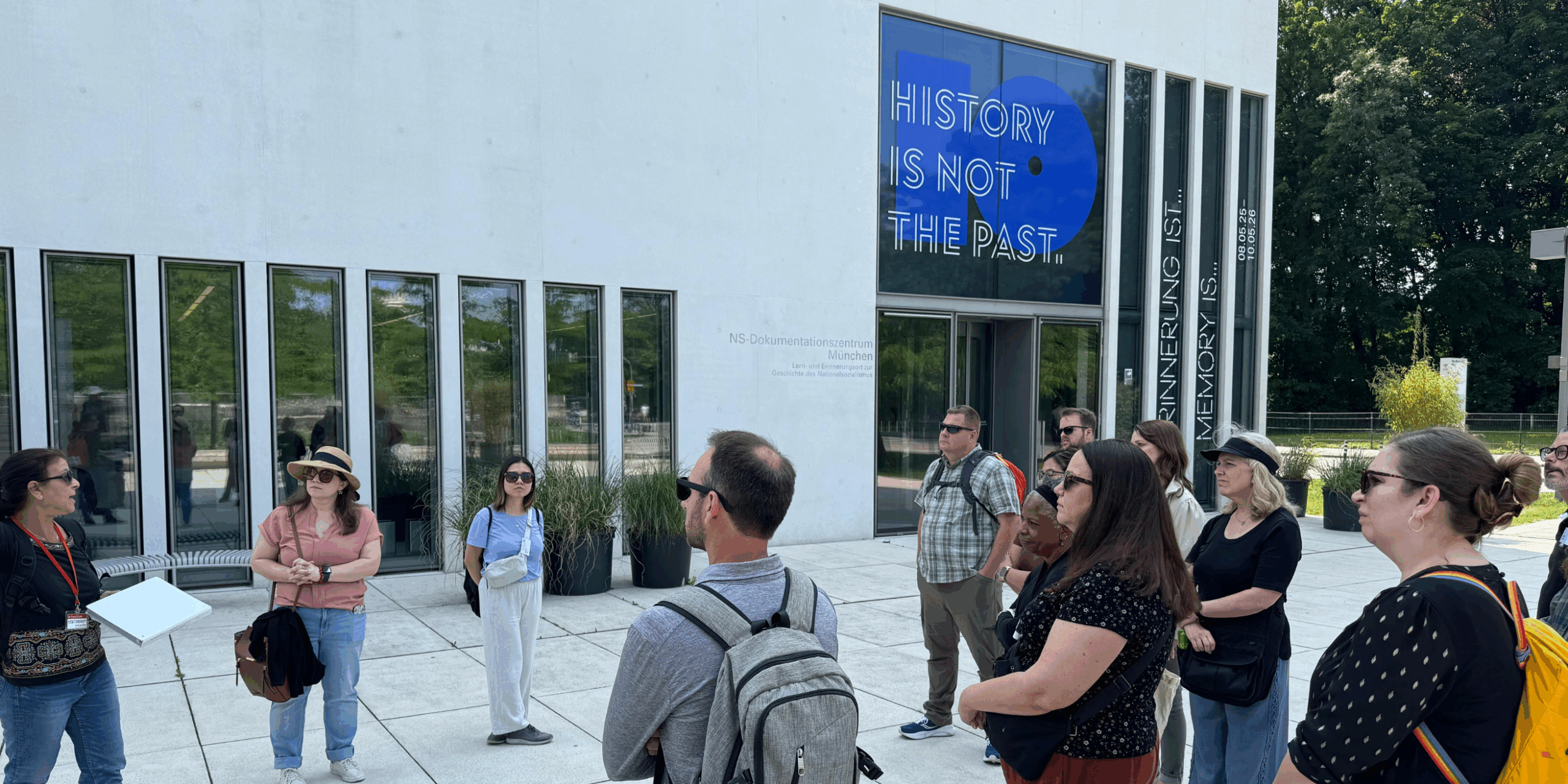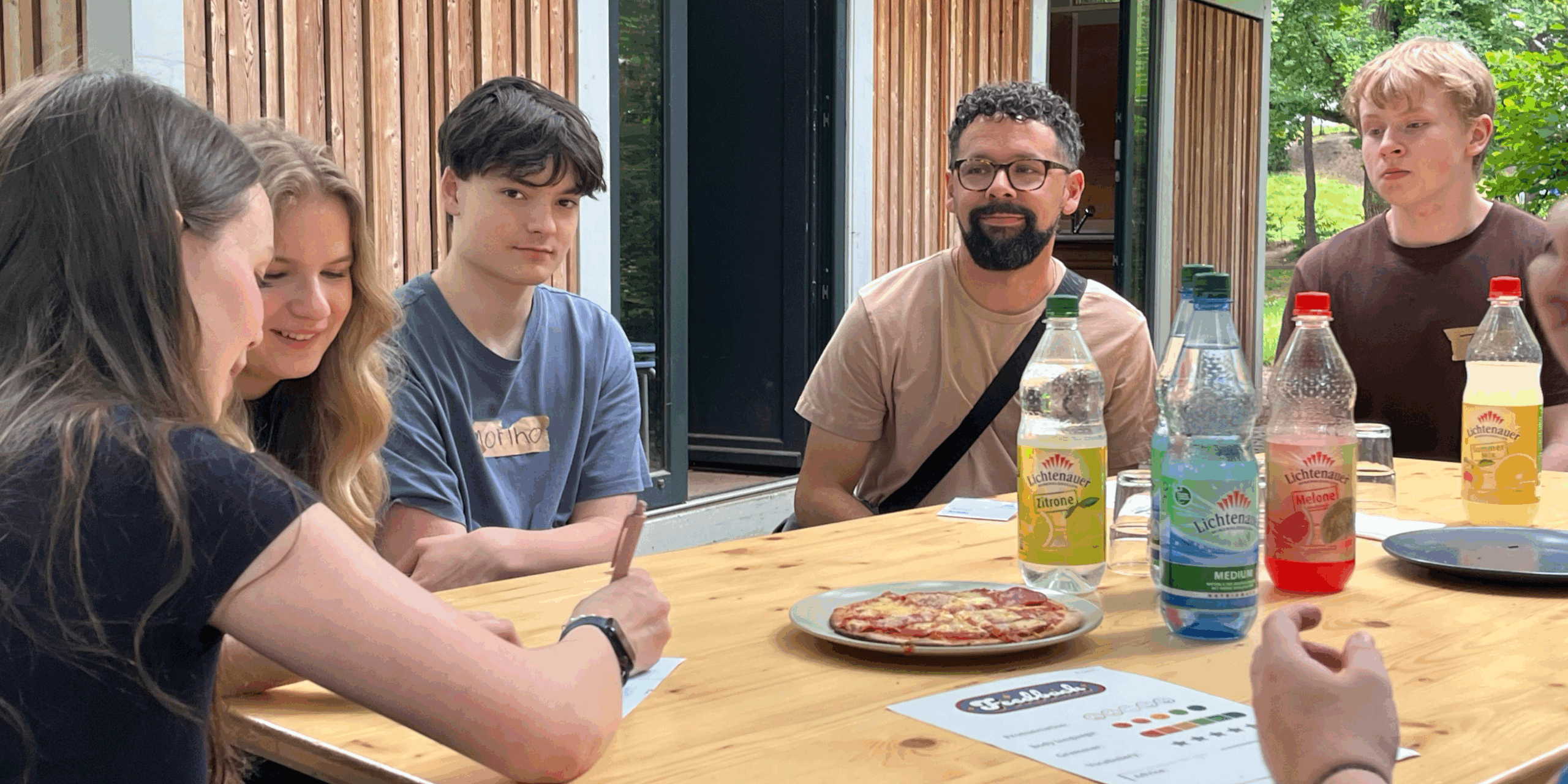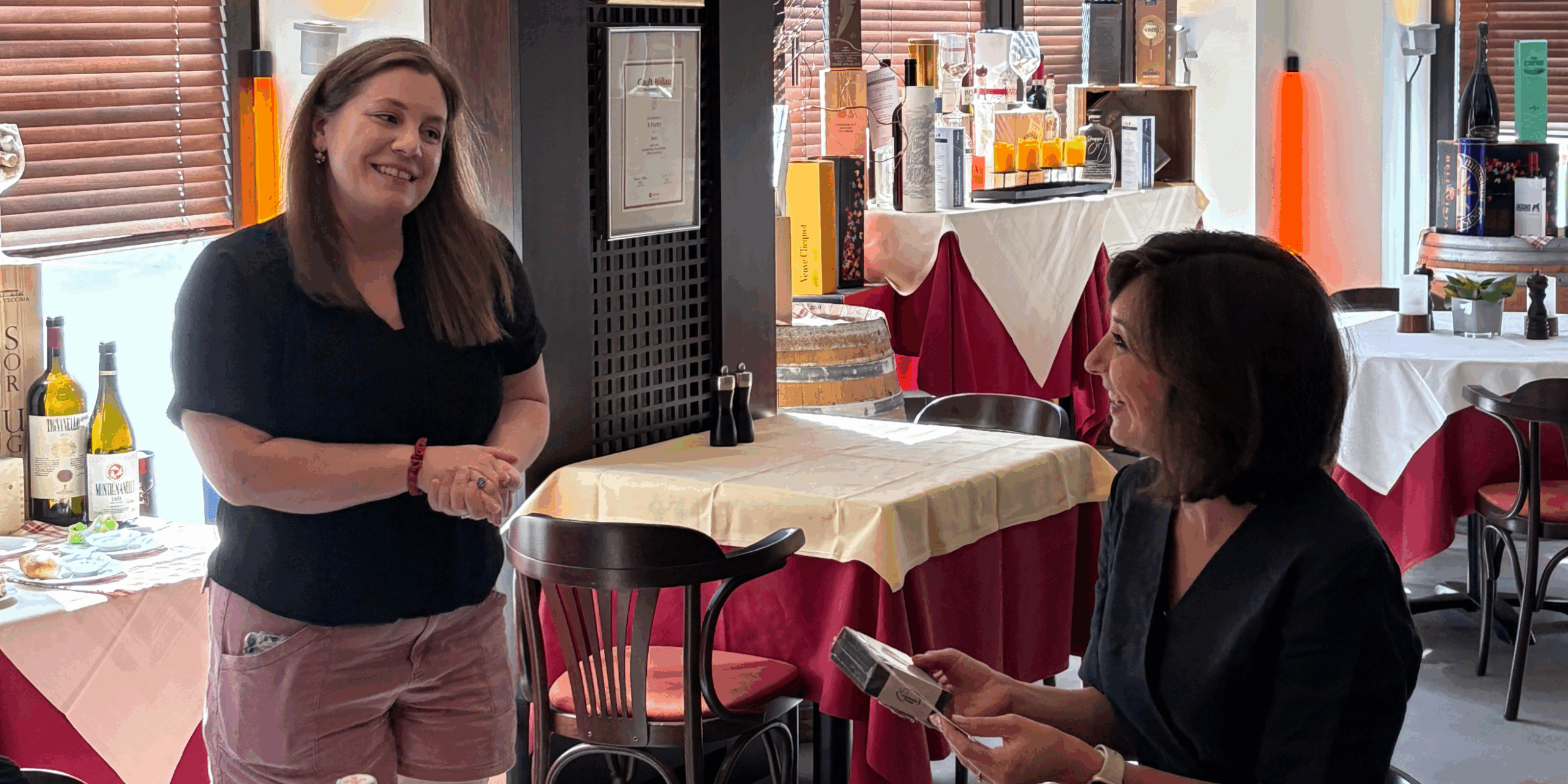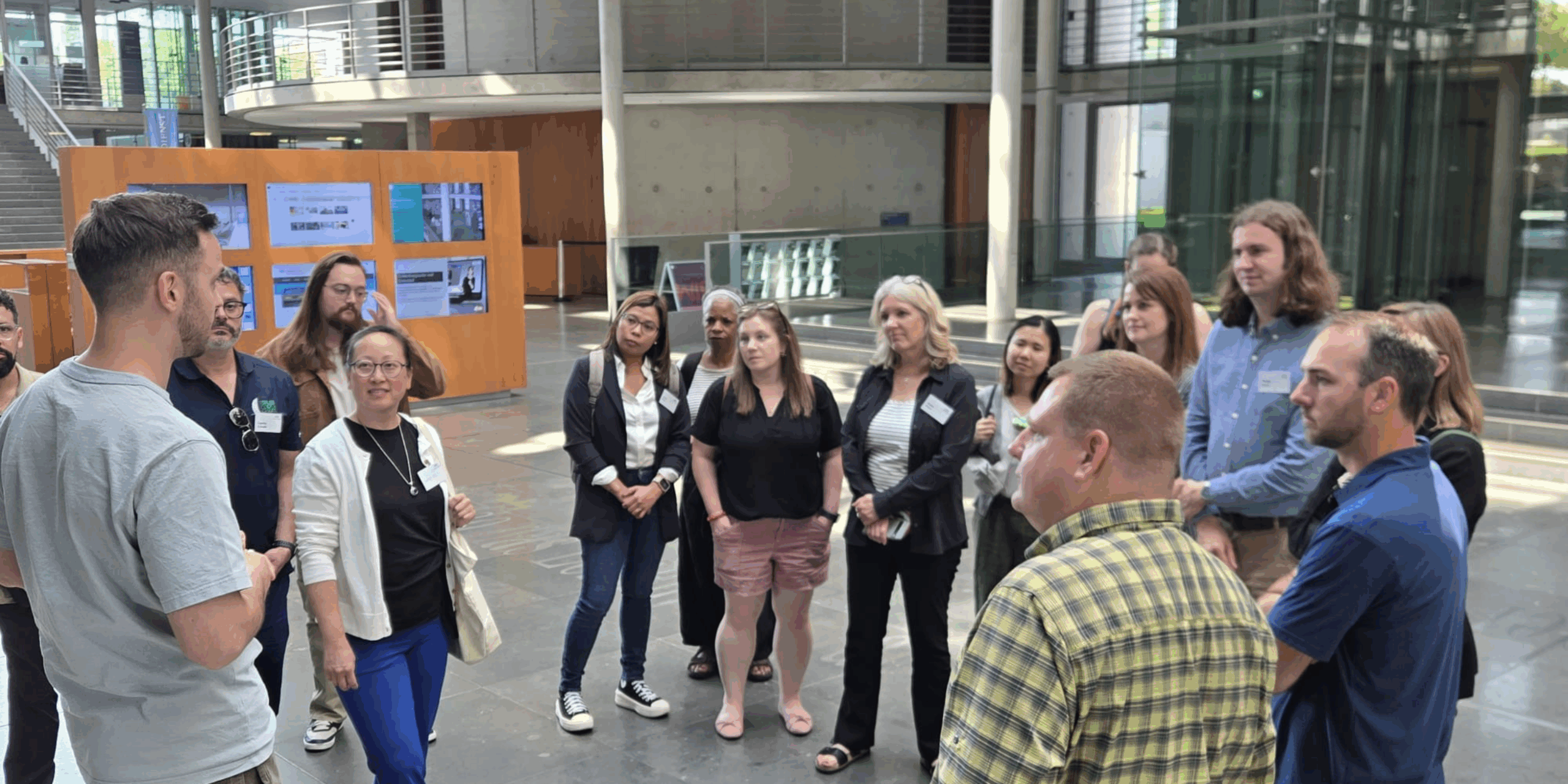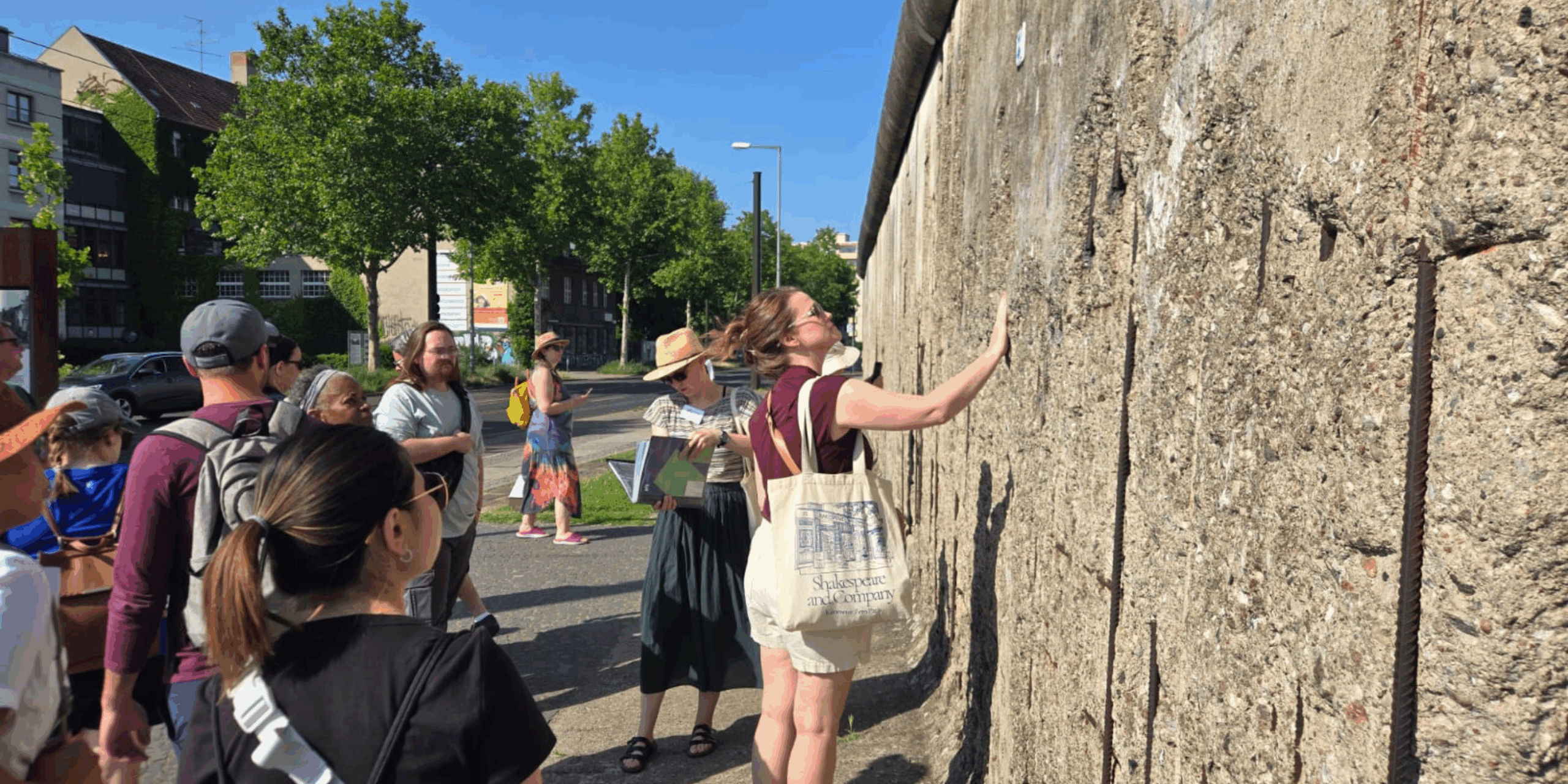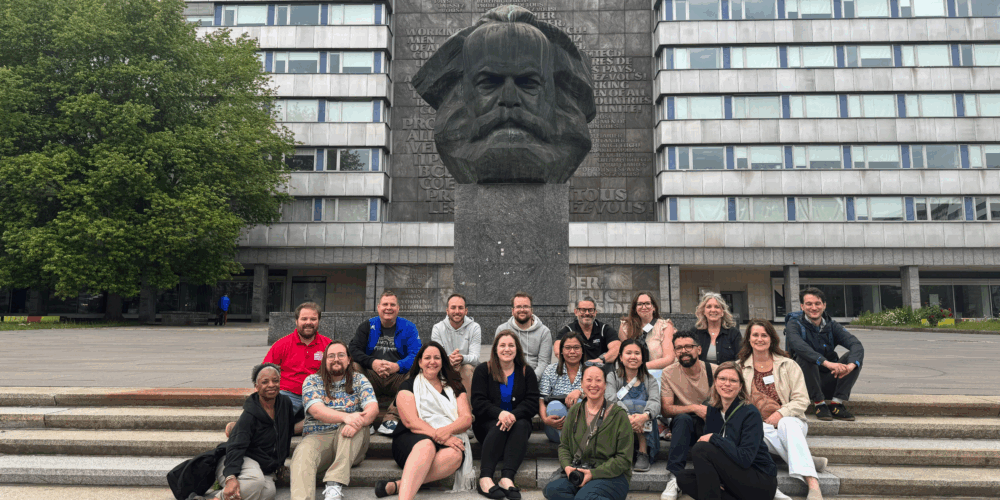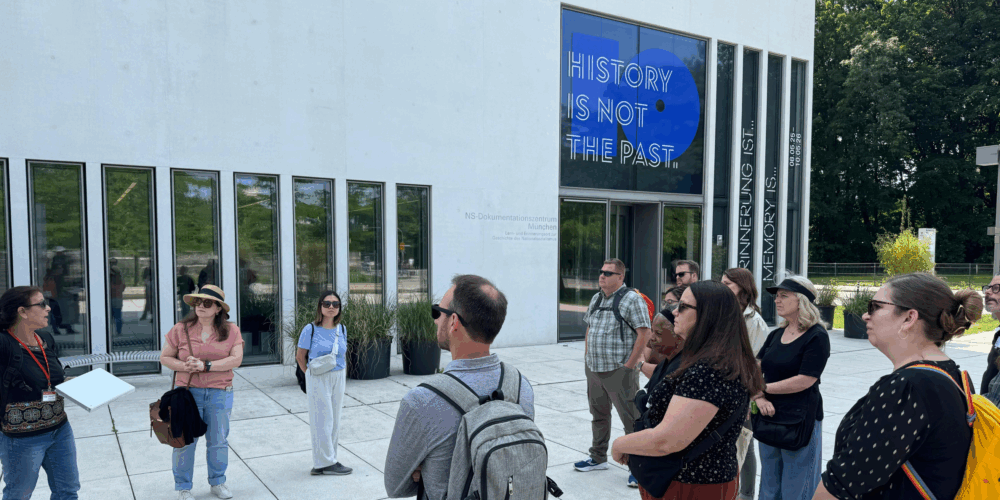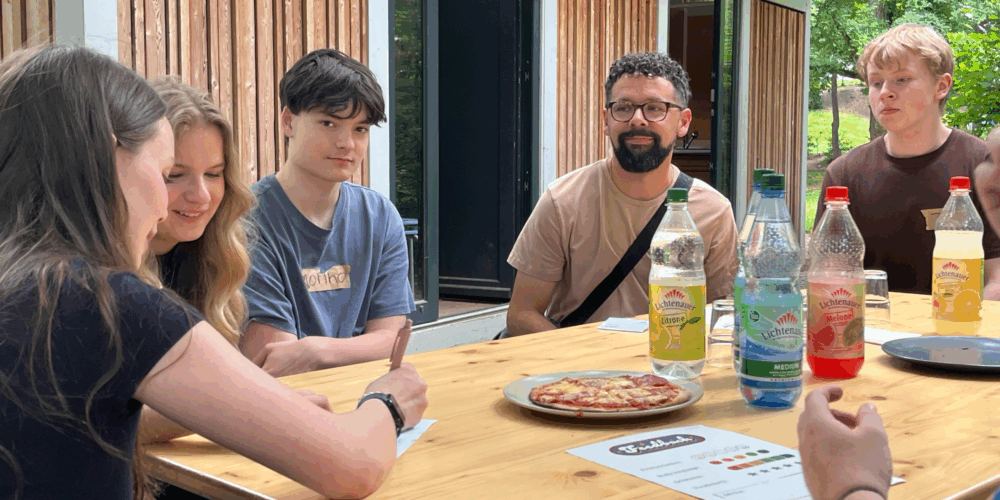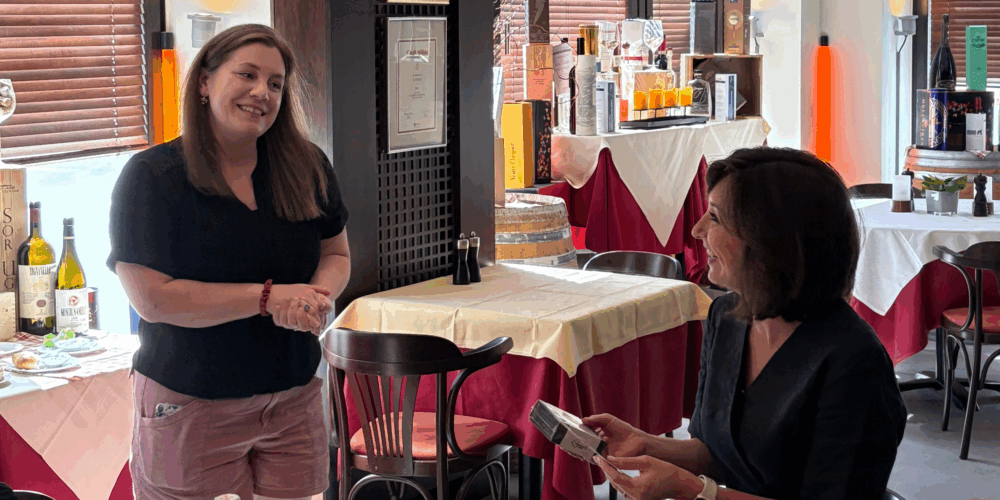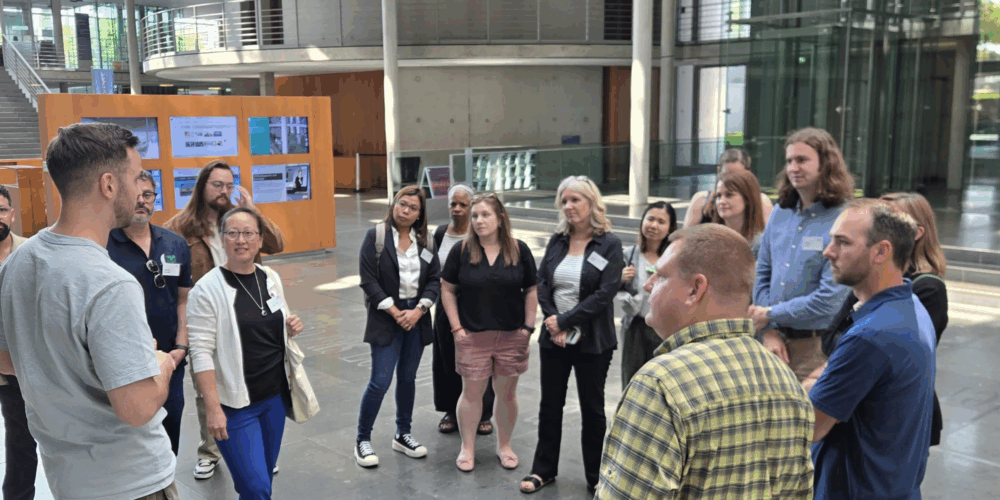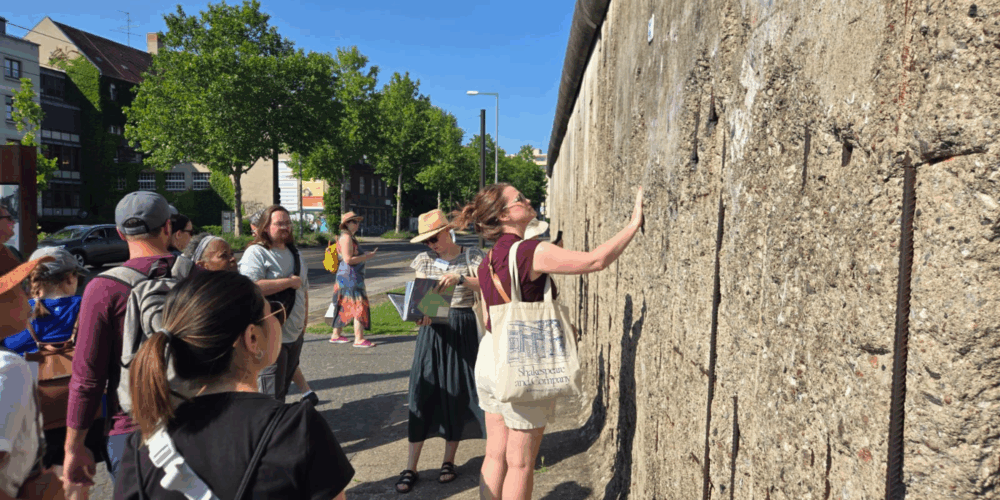Resilience, reconciliation, and remembrance in modern Germany
German-American relations thrive not only on strategic political deliberations, but also on cultural and emotional connections. In a best-case scenario, the groundwork for intercultural exchange is laid early on in life, for example through the efforts of dedicated teachers. This is why the Atlantik-Brücke, with the generous support of the Saxon Ministry of Education, enables selected US teachers to take an educational trip to Germany and selected East German teachers to travel to the US. In June, we welcomed a cohort of 15 US educators to Germany. Amy Brownlee, one of our participants, shares her insights:
by Amy Brownlee
I was honored to be one of fifteen American teachers from thirteen different states selected to participate in the Atlantik-Brücke Transatlantic Study Trip. We traveled through Germany June 8-16, 2025, visiting the cities of Munich, Chemnitz, Dresden, and Berlin. The trip’s itinerary and learning experiences were expertly planned and provided a well-rounded taste of modern Germany.
The outstanding and varied program of activities focused on the areas of: education; history; government, politics, and the media; business and commerce; culture; and environmental sustainability. While it is difficult to convey the full richness of what we experienced, I will share highlights, key learnings, and personal insights.
Education
Visiting schools and talking with German students and teachers was the best part of the trip for me. In speaking with students and learning about their schools first-hand, we were given a remarkable experience that is not available to the average visitor.
We visited three different schools where we enjoyed student-led tours. Each school had its own unique strengths. One school excelled at project-based learning, career exploration, multi-age activities, and clubs. Another school was proud of its historical building, and advanced courses in music and art. At one site, a group of students had prepared presentation stations on different aspects of school life.
“Germany lags behind the United States when it comes to serving special education students.”
Each school visit also included a discussion period or question-and-answer session. The students did not shy away from asking difficult questions about topics such as school shootings and the political climate under the current U.S. president. It was fascinating to learn about the students’ perception of the United States and to find out more about their education system.
Our briefing on Saxony’s education system at the Saxony State Ministry of Education and Cultural Affairs provided insights on school structure with an emphasis on vocational education and civic education.
Our meeting at Technical University Dresden focused on the teacher training program. We learned that German secondary teachers typically teach two different subjects and are not required to take continuing education classes to retain certification like we are in the U.S. Both Germany and America are currently experiencing a teacher shortage.
We learned that Germany lags behind the United States when it comes to serving special education students. While U.S. schools practice inclusion by integrating students with special needs into the regular classroom with their peers, German special education students attend separate schools.
However, because attending university is free or low-cost for Germans, they are able to earn a degree without the college loan debt that financially cripples many Americans.
“Turning the Dachau concentration camp into a place of peaceful remembrance removes the power of the oppressors and gives the camp over to those who remember and vow “never again.””
History
Our walking tours in Munich, Dresden, and Berlin allowed us to see notable sites in each location and learn about each city’s historical significance.
Highlights of the Munich tour on National Socialism and Resistance included learning about the White Rose Society and activist Sophie Scholl and seeing bullet hole damage from the war left on a building as a remembrance of what happened there.
Our Berlin walking tour gave us incredible insight into the complicated history and turmoil that has happened there. Walking through the Memorial to the Murdered Jews of Europe and learning about the powerful Stolperstein memorials scattered throughout 24 countries was meaningful and thought-provoking.
Equally powerful was our guided tour at the Berlin Wall Memorial where we learned about the wall’s impact and ramifications. The Stasi Prison tour gave insights into life under the communist regime.
Visiting Dachau Concentration Camp Memorial was a sobering and emotionally challenging experience. As I stepped onto the grounds, I felt the heaviness of the horrific cruelty that happened there, but as I walked the tree-lined lane on the way to the chapels, I felt a sense of calm. Turning the camp into a place of peaceful remembrance removes the power of the oppressors and gives the camp over to those who remember and vow “never again.”
Government, politics, and media
We had several informative meetings with experts in the fields of government, politics, and media.
Our dinner meeting with two university researchers gave us an excellent overview of Germany’s political system, including leadership, political parties, structure of parliament, and recent elections. I was intrigued to learn about the coalition system and wondered if something similar could work at home in America.
Our tour of the Bundestag offices and Reichstag building was an excellent follow-up to our study of Germany’s governmental system, and our discussion with a city council member gave us a feel for local politics and immigration issues.
Kate Brady shared insights into her work as a Washington Post researcher and reporter based in Berlin. Her work is vital because quality journalism based on factual information is essential to democracy and is under attack due to the spread of misinformation.
“Hearing America described as a “less reliable ally” and that America’s “democracy is in a profound state of crisis” was alarming.”
One of the most impactful meetings of the entire trip was visiting the German Institute for International and Security Affairs, whose goals are promoting and preserving democracy and security. Our engaging session focused on learning about EU-US relations from Dr. Marco Overhaus and Dr. phil. Ronja Kempin. Hearing Dr. Overhaus describe America as a “less reliable ally” and remark that our America’s “democracy is in a profound state of crisis” was alarming. They expressed concern because trends happening in America often come to the EU 5-10 years later.
Business and commerce
We received a briefing on Chemnitz as the European Capital of Culture 2025, and a tour of the Feldschlösschen Brewery gave us a view of a successful business. After learning about the strength of Germany’s vocational education, I was eager to learn more system through our visit to the Chamber of Commerce and Industry. We toured a vocational school and saw students completing hands-on training in fully-equipped labs.
Dr. Nick Pruditsch, who focuses on the labor market and skilled workers, explained how the Chamber of Commerce and Industry works with businesses to project what fields will need workers, match students with jobs, and provide training.
Culture
We experienced many elements of German culture firsthand, including visiting biergartens and tasting specialty foods in each region. Traveling to different cities allowed us to contrast the more traditional Bavarian culture with modern and progressive Berlin.
On our tour of the Seiffen Open-Air Museum, we were able to explore rural life and culture in the Ore Mountains and learn about handmade wooden items produced by local artisans.
Environmental sustainability
Dennis Tänzler from the think tank Adelphi shared about Germany’s commitment to phase out the use of coal by 2038, and we learned that the country is actively working on alternative energy sources since they are no longer buying natural gas from Russia.
“Throughout my time in Germany, I observed a variety of sustainability efforts.”
Throughout my time in Germany, I observed a variety of sustainability efforts. We saw multiple wind turbines and banks of solar panels. I also observed public recycling, frequent use of bicycles and walking, efficient public transport, less use of air conditioning, restaurants striving to produce less waste, and hotel energy conservation systems. Although these things were not part of a planned program, they added greatly to my understanding of Germany’s sustainability efforts and inspired me to incorporate more of these practices at home.
Impact on teaching
I noticed several practices common in German education that could be implemented in the U.S. to improve the effectiveness of our schools:
- At one school, students are not given formal grades on report cards in grades 1-7. Students reported liking this system because they feel it takes off pressure to perform.
- One classroom is shared by multiple teachers, so teachers don’t spend a lot of time and funds decorating and personalizing their classrooms as is common in the U.S., which leaves more time to focus on teaching and improves work/life balance.
- Teachers have workstations in a common space, which increases collaboration and communication.
- There is a heavy emphasis on civic education and recognizing misinformation. Ramping up this type of instruction is sorely needed in the U.S.
- At one school, sixth-grade students research the life of a person who died during the Holocaust and honor their memory.
Impact on my perception of Germany and transatlantic relationship
Before this trip, most of my knowledge of Germany came from studying World War II. I was amazed to learn about Germany’s resilience demonstrated through the monumental effort to rebuild after World War II as well as reconciliation efforts after overcoming both physical and ideological divisions. I was extremely impressed with the country’s commitment to collective responsibility and creating a culture of remembrance and feel the U.S. could follow Germany’s lead in those areas.
I learned that in Germany, there is a law against public display of Nazi symbols such as a flag or salute. While this may restrict personal freedom, it is for the greater good. The United States could apply this philosophy to issues such as of gun control.
Personal impact
This trip gave me a completely new view of modern Germany through the transformative experience of discovering the country’s culture of resilience, reconciliation, and remembrance. The impacts of this fellowship are far-reaching and immensely valuable, both personally and professionally. In providing a study trip for American teachers, Atlantik-Brücke has lived up to its name; the whole experience created a strong bridge connecting us to Germany’s history, culture, and people.
Amy Brownlee is a reading teacher and librarian at a small, rural school district in Kansas. She was named the 2017 Kansas School Librarian of the Year and was selected for a National Endowment for the Humanities institute. She won a Fulbright-Hays fellowship and spent a month in Africa with the non-profit Ethiopia Reads and was part of this year’s cohort of Atlantik-Brücke’s Transatlantic Study Trip for Teachers.

